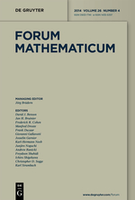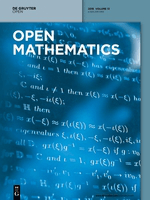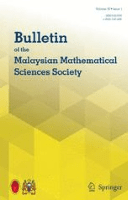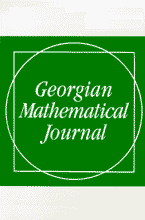
Moscow University Mathematics Bulletin
Scope & Guideline
Empowering Mathematicians with Insightful Research
Introduction
Aims and Scopes
- Topology and Geometric Analysis:
The journal features significant contributions in topology, including studies on topological invariants, geometric properties of various mathematical structures, and applications to dynamical systems and billiards. - Functional Analysis and Operator Theory:
Research in this area includes exploration of functional spaces, properties of operators, and advanced analytical methods. Topics such as Sobolev spaces, differential operators, and integrable systems are commonly examined. - Differential Equations and Dynamical Systems:
A core focus of the journal is the study of differential equations, including boundary value problems, stability analysis, and the behavior of solutions under varying conditions. - Probability and Stochastic Processes:
The journal covers stochastic models and probabilistic methods, addressing topics such as random walks, point processes, and statistical properties of systems. - Mathematical Logic and Computability:
Research on the foundations of mathematics, including computability theory, logic, and algorithmic complexity, is also a prominent area of publication. - Mathematical Modelling and Applications:
The journal publishes works that apply mathematical theories to real-world problems, including domains such as physics, biology, and engineering.
Trending and Emerging
- Advanced Topics in Dynamical Systems:
There is an increasing focus on dynamical systems, particularly in the context of stability, chaos, and bifurcations, as evidenced by several recent papers exploring complex behaviors in various mathematical models. - Interdisciplinary Applications of Mathematics:
The journal is seeing a rise in publications that bridge mathematics with other fields, such as biology, physics, and engineering, showcasing the application of mathematical theories to solve interdisciplinary problems. - Computational Mathematics and Algorithms:
Research focusing on computational methods, algorithms, and their efficiency is trending, with an emphasis on practical computational techniques in various mathematical contexts. - Nonlinear Analysis and Partial Differential Equations (PDEs):
There is a growing interest in nonlinear analysis and the study of PDEs, particularly in relation to complex boundary conditions and unique solution properties, reflecting contemporary challenges in mathematical physics. - Stochastic Modeling and Random Processes:
The exploration of stochastic processes is gaining traction, with an increasing number of studies focusing on randomness in systems, particularly in relation to statistical mechanics and probabilistic modeling.
Declining or Waning
- Classical Geometry:
Although geometry remains an essential area, the specific focus on classical geometrical constructs has decreased. Recent publications show a shift towards more abstract and applied geometric theories rather than traditional geometric problems. - Elementary Number Theory:
Research related to elementary number theory has become less prominent, with fewer papers addressing classical topics such as divisibility, prime numbers, and congruences, signaling a possible shift towards more complex and abstract areas. - Basic Combinatorial Structures:
The exploration of basic combinatorial problems and structures has seen a decline, with fewer studies on foundational combinatorial principles compared to more advanced combinatorial theories and applications. - Historical Perspectives in Mathematics:
Papers focusing on historical aspects of mathematical theories or the evolution of mathematical thought are less frequent, indicating a possible waning interest in the historical context of mathematical developments.
Similar Journals

FORUM MATHEMATICUM
Pioneering Research in Applied and Theoretical MathematicsFORUM MATHEMATICUM, published by WALTER DE GRUYTER GMBH, is a distinguished academic journal based in Germany, known for its significant contributions to the field of mathematics. With an ISSN of 0933-7741 and an E-ISSN of 1435-5337, the journal features comprehensive studies ranging from applied mathematics to diverse mathematical disciplines. Having maintained a commendable presence since 1989, FORUM MATHEMATICUM has achieved notable classification rankings, including Q2 in Applied Mathematics and Q1 in miscellaneous Mathematics as of 2023. Additionally, it holds a Scopus rank within the top 60th percentile in General Mathematics, making it a prominent platform for researchers and professionals seeking rigorous analysis and innovative methodologies in mathematics. While the journal does not currently offer open access, its rich content is pivotal for advancing mathematical theory and applications, appealing to students and seasoned academics alike.

Bulletin Mathematique de la Societe des Sciences Mathematiques de Roumanie
Exploring the Depths of Theoretical and Applied MathematicsThe Bulletin Mathematique de la Societe des Sciences Mathematiques de Roumanie, published by SOC MATEMATICE ROMANIA, is a distinguished platform dedicated to the dissemination of advanced mathematical research and developments. With ISSN 1220-3874 and E-ISSN 2065-0264, this journal serves the global mathematical community, particularly in Romania, fostering collaboration and innovation in varied mathematical disciplines. Despite being categorized in the Q3 quartile of the *Mathematics (miscellaneous)* field and holding a Scopus rank placing it in the 19th percentile, the journal remains committed to publishing high-quality articles that explore theoretical and applied mathematics. Running from 2008 to 2024, it aims to encourage the sharing of knowledge and advancements within both academic and practical domains, affirming its importance as a valuable resource for researchers, professionals, and students alike. Although the journal does not currently offer open access, it contributes to the mathematical discourse through the rigorous selection of papers that adhere to high scholarly standards.

CUBO-A Mathematical Journal
Unlocking New Perspectives in MathematicsCUBO-A Mathematical Journal, published by the Department of Mathematics and Statistics at Universidad de La Frontera in Chile, stands as a significant Open Access resource in the field of mathematics since its inception in 2011. With an ISSN of 0716-7776 and an E-ISSN of 0719-0646, this journal invites submissions that explore a wide spectrum of mathematical disciplines, including Algebra, Number Theory, Analysis, Geometry, Topology, and Logic. Although currently positioned in the Q4 category across various mathematical domains and registered at Rank #223/399 in General Mathematics in Scopus, CUBO serves as a valuable platform for emerging researchers and practitioners to disseminate their findings. Operating under a continuous commitment to accessibility, CUBO fosters an inclusive academic environment that supports the exchange of innovative ideas vital to advancing mathematics. The journal's target audience encompasses a diverse community of researchers, professionals, and students eager to participate in the expanding dialogue within mathematical sciences.

Open Mathematics
Unlocking Innovative Insights in MathematicsOpen Mathematics, published by DE GRUYTER POLAND SP Z O O, is a prominent peer-reviewed journal that has been a vital platform for disseminating innovative research in the field of mathematics since its inception in 2015. With an impressive impact factor reflected by its Q2 ranking in the miscellaneous mathematics category and a commendable Scopus rank of #91 out of 399, it positions itself as a significant contributor to the mathematical community. This open access journal, headquartered in Poland, welcomes submissions that tackle diverse mathematical theories, applications, and methodologies, fostering knowledge exchange among researchers, professionals, and students globally. Since its launch, Open Mathematics has focused on bridging the gap between theoretical advancement and practical applications, making it an essential resource for anyone seeking to stay at the forefront of mathematical research and innovation. The journal offers easy online access, enhancing the visibility and impact of the valuable work published within its pages.

Glasnik Matematicki
Advancing Mathematical Frontiers with Every IssueGlasnik Matematicki is a prestigious academic journal published by the Croatian Mathematical Society, focusing on a broad spectrum of topics within the field of mathematics. Established in Croatia, this journal has gained recognition for its contributions to the mathematical community, providing a platform for researchers and scholars to share their groundbreaking findings and innovative theories. The journal operates without an open access model, encouraging traditional subscription-based readership, which enhances its standing among journals in the field. With a respectable impact factor and categorized in the Q3 quartile for mathematics (miscellaneous) as of 2023, Glasnik Matematicki is vital for those engaged in advanced mathematical research and education. It aims to disseminate significant mathematical advancements and facilitate scholarly exchange, making it an essential resource for students, professionals, and researchers alike. The journal’s convergence period from 2006 to 2024 marks its ongoing commitment to academic excellence and its relevance in contemporary mathematical discourse.

BULLETIN OF THE BRAZILIAN MATHEMATICAL SOCIETY
Empowering Mathematicians Through Scholarly DiscourseBulletin of the Brazilian Mathematical Society is a distinguished journal published by Springer Heidelberg, aimed at advancing the field of mathematics through the dissemination of research findings and scholarly discourse. With an ISSN of 1678-7544 and an E-ISSN of 1678-7714, this journal is indexed within the Q2 quartile in the field of mathematics (miscellaneous), reflecting its impact and relevance in the academic community. The journal has been recognized for its commitment to quality, as evidenced by its Scopus ranking within the 58th percentile among general mathematics publications. Since its inception in 1996, the Bulletin has served as a vital platform for mathematicians to share innovative ideas, theoretical advancements, and practical applications, making it essential reading for researchers, professionals, and students alike. Open access options are available, ensuring that the latest research is accessible to a wide audience, thereby fostering collaboration and growth within the mathematics community.

Bulletin of the Malaysian Mathematical Sciences Society
Bridging Theory and Application in Mathematical SciencesThe Bulletin of the Malaysian Mathematical Sciences Society, published by SPRINGER NATURE, is a prominent academic journal dedicated to advancing the field of mathematics. With an ISSN of 0126-6705 and an E-ISSN of 2180-4206, the journal has established itself as a vital resource for researchers, professionals, and students alike. Based in Singapore, it boasts an impressive Q2 ranking in the miscellaneous mathematics category for 2023, alongside a notable position of 90th out of 399 in the general mathematics Scopus rankings, placing it in the 77th percentile. The Bulletin serves to disseminate innovative research findings, foster mathematical dialogue, and promote collaboration among the global mathematical community, with coverage ranging from theoretical frameworks to practical applications. Readers can expect an engaging mix of original research articles, reviews, and communications that contribute significantly to the evolving landscape of mathematical sciences.

Pure and Applied Mathematics Quarterly
Pioneering Insights in Pure and Applied MathematicsPure and Applied Mathematics Quarterly is a prestigious journal published by INT PRESS BOSTON, INC, focusing on the diverse and evolving field of mathematics. Since its inception in 2007, this journal has grown significantly, currently holding a Q1 ranking in the Mathematics (Miscellaneous) category for 2023, positioning it among the leading publications in the discipline. With a commitment to publishing high-quality research, Pure and Applied Mathematics Quarterly fosters innovation and dialogue within the mathematical community by providing a platform for theoretical advancements and practical applications. The journal remains accessible to researchers and professionals through its ISSN 1558-8599 and E-ISSN 1558-8602, although it does not currently offer open access. As a vital resource for mathematicians, educators, and students, this journal endeavors to expand the frontiers of mathematical knowledge and contribute to the academic dialogue surrounding this fundamental science.

Georgian Mathematical Journal
Exploring the depths of mathematics for global impact.Georgian Mathematical Journal, published by Walter de Gruyter GmbH, is a prestigious academic journal dedicated to the field of mathematics, particularly in its multifaceted applications and theoretical explorations. With an ISSN of 1072-947X and an E-ISSN of 1572-9176, this journal is indexed within notable databases and holds a strong position as evidenced by its Q2 ranking in the Mathematics (miscellaneous) category as of 2023 and a ranking of #140 out of 399 in the general mathematics Scopus category, placing it in the 65th percentile for research visibility. Since its inception in 1994, the journal has continued to evolve, aiming to foster innovative research and scholarly communication among mathematicians worldwide. Although it does not offer Open Access, the journal’s commitment to quality and rigor ensures that published works are of high relevance, appealing to researchers, educators, and students who are dedicated to advancing mathematical knowledge across diverse domains.

Korean Journal of Mathematics
Elevating the Standards of Mathematical Scholarship.The Korean Journal of Mathematics, published by the Kangwon-Kyungki Mathematical Society, is an esteemed platform dedicated to advancing the field of mathematics. With an ISSN of 1976-8605 and E-ISSN of 2288-1433, the journal features a range of scholarly articles that emphasize both theoretical and applied aspects of mathematics, catering to researchers, professionals, and students alike. Although it is not open access, the journal maintains a commitment to academic rigor and integrity, ensuring high-quality contributions to the mathematical community. As it converges from years 2021 to 2024, the Korean Journal of Mathematics is poised to enhance its visibility within the Scopus database, currently ranking #354 out of 399 in the general mathematics category, reflecting its potential for growth and impact in the mathematical sciences. With its strategic focus and institutional backing from Kangwon National University, the journal serves as a vital resource for fostering research and dialogue in the ever-evolving landscape of mathematics.